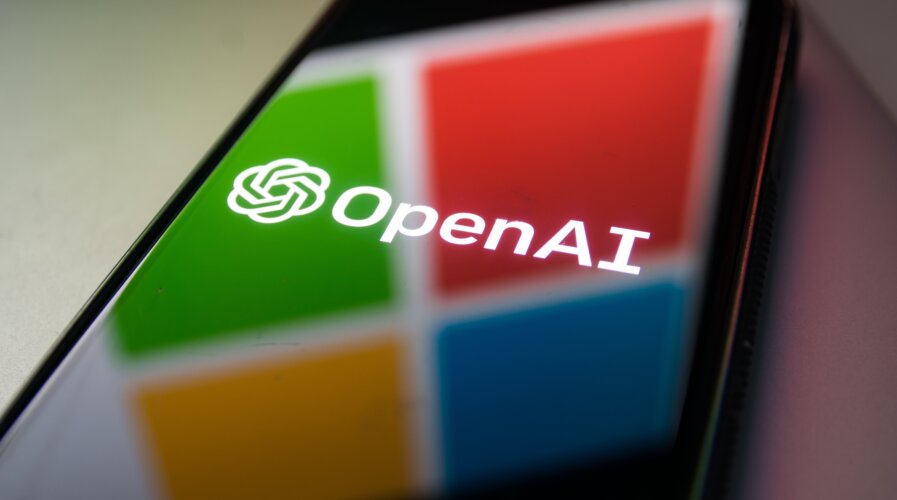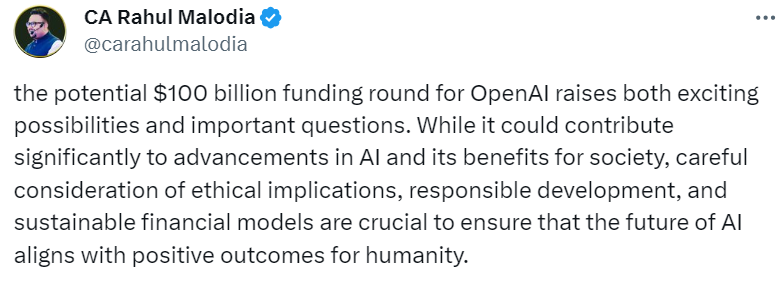
OpenAI approaches landmark US$100 billion valuation. (Source – Shutterstock).
OpenAI poised for potential leap to a US$100 billion valuation
- The potential valuation of OpenAI over US$100 billion signals a significant shift in the AI market.
- Post-ChatGPT, OpenAI leads the generative AI market, influencing tech investments.
- OpenAI’s semiconductor venture and market dominance underscore the evolution of the AI industry.
The generative AI market is on the brink of a transformative explosion, fueled by the advent of groundbreaking consumer programs like Google’s Bard and OpenAI’s ChatGPT. These innovations are reshaping the landscape of AI, ushering in an era of unprecedented growth and possibilities.
The new OpenAI funding round and valuation prospects
OpenAI, supported by Microsoft Corp, is reportedly in the preliminary stages of arranging a new funding round, potentially achieving a valuation of over US$100 billion. This development could elevate the ChatGPT developer to one of the highest-valued startups globally.
During these initial discussions, potential investors are being evaluated for their involvement in the funding round. The sources beind the story, opting for anonymity due to the confidential nature of these talks, note that details like funding terms, valuation, and timelines are still being negotiated and could change.
If this funding round proceeds as expected, OpenAI might become the second most valuable startup in the United States, only behind Elon Musk’s Space Exploration Technologies Corp, according to CB Insights’ data. Such a move would significantly boost OpenAI’s status in the artificial intelligence industry.
Located in San Francisco, California, the company is on track to complete a separate tender offer in early January, allowing employees to sell their shares at a US$86 billion valuation, as Bloomberg previously reported. This offer, orchestrated by Thrive Capital, experienced a higher demand from investors than the number of shares available allowed.
The remarkable surge in OpenAI’s valuation reflects the intense excitement within the AI sector following ChatGPT’s release a year ago – and the flourishing of the industry since. The chatbot, famed for its human-like text and poetry generation, propelled OpenAI to Silicon Valley’s forefront, amassing US$13 billion from investors, including Microsoft. ChatGPT’s debut has sparked a widespread interest in the potential of AI, rapidly altering the tech industry landscape.

The announcement from OpenAI brings attention on the future of AI to align with positive outcomes for humanity. (Source – X).
In the wake of OpenAI’s success, major corporations such as Amazon.com and Alphabet (Google’s parent company) have substantially invested in Anthropic, OpenAI’s rival. Salesforce has invested in Hugging Face, valuing it at US$4.5 billion. Nvidia Corp, known for its AI task-essential semiconductors, announced over two dozen investments in 2023.
OpenAI is also reportedly engaging in discussions to raise funds for a new semiconductor project with G42, a firm based in Abu Dhabi. Sources suggest that the startup is contemplating raising between US$8 billion and US$10 billion from G42. It is still unclear if this semiconductor venture’s funding is connected to OpenAI’s broader fundraising efforts.
Sam Altman, CEO of OpenAI, is actively seeking investment for a semiconductor manufacturing initiative, internally named Tigris. This project aims to produce semiconductors capable of competing with those from Nvidia, currently leading the AI chip market, as Bloomberg reported last month.
Competitive landscape in generative AI
The AI industry in 2023 is not just a hub of technological innovation; it represents a competitive arena of ideas, capital, and strategies prepared for the future, experiencing booming growth with projections indicating substantial expansion.
IoT Analytics, a leading market insights and strategic intelligence provider, has recently identified the top contenders in the fast-growing generative AI market through its latest Generative AI Market Report. The report emphasizes the dominant roles of Nvidia, OpenAI, Microsoft, and Accenture’s emerging status as a significant services center.
IoT Analytics’ report depicts the generative AI market’s rapid transformation from relative obscurity to a bustling center of activity within a single year. The report delved into three interlinked segments of the generative AI domain: data center GPUs, foundational models and platforms, and generative AI services, each showcasing distinct characteristics and critical players.
Knud Lasse Lueth, CEO of IoT Analytics, underlined the swift evolution within the generative AI sector. He pointed out Nvidia’s dominant 92% stake in the data center GPU market and the combined 69% market share of Microsoft and OpenAI in the models and platforms sector. He highlighted the dynamics of competition, especially as significant players develop their own data center chips and given the proliferation of potent open-source models.
Generative AI’s expanding market reach
The significant role of generative AI is evident in OpenAI’s achievements, especially following the launch of ChatGPT in 2022, and in Nvidia’s growing sales in data center GPUs, rising from US$3.6 billion in Q4 2022 to a projected US$16 billion in Q4 2023. The foundational models and platforms segment of generative AI is expected to constitute nearly 5% of the global software expenditure by 2030, underscoring its disruptive impact and substantial market value. Furthermore, the data center GPU market reached US$49 billion in 2023, driven mainly by Nvidia’s efforts, despite supply issues and increasing prices.
The analysis also sheds light on the primary entities in the generative AI foundational model and platform market. OpenAI takes the lead with a 39% market share ahead of its potential new valuation, bolstered by the widespread adoption of its GPT models. Microsoft is close behind with a 30% stake, thanks to its Azure AI platform and Microsoft Copilot; moreover, Microsoft’s Copilot has been pivotal for the company this year. AWS holds a notable 8% share in the market with its Bedrock service.
This is a positive development for Microsoft, currently in the forefront of the generative AI market, especially as rivals like Alphabet’s Google Bard are catching up. CNBC reported that the tech giant’s shares have seen a 55% increase this year, significantly outperforming the S&P 500’s returns. Analysts have set ambitious price targets for Microsoft, anticipating generative AI revenues to potentially hit US$10 billion annually.
Since the launch of ChatGPT in late November 2022, Microsoft’s investment in OpenAI has led to a substantial rise in its stock value, from around US$240 to over US$370. Despite recent upheavals in the boardroom, this growth has been achieved, with Microsoft now asserting a more direct role in monitoring OpenAI’s operations.
Gartner analyst Jason Wong referenced a survey indicating high regard for Microsoft 365 Copilot among IT buyers, with 82% considering it one of the top three most valuable new features. The general release of Copilot for Microsoft 365 in November, following an initial pilot program starting last May that reached 600 customers, is anticipated to boost corporate spending significantly. Although some businesses initially hesitated due to costs and potential legal concerns, many are now embracing generative AI technology.
While some corporations initially balked at the 300-seat minimum requirement and the monthly cost of $30 per user for the software, the widespread availability of Copilot has spurred renewed interest. In August, Alphabet introduced Duet AI for Google work apps at a similar monthly rate for corporate users.
Microsoft has highlighted several significant clients utilizing Copilot, including Visa, BP, Honda, and Pfizer. Professional services firms such as Accenture, EY, KPMG, and PwC are also collaborating on Copilot AI projects. Notably, PwC is rolling out ChatPwC to 75,000 employees by the end of this year, demonstrating the extensive adoption of AI in the corporate sector.
While it was always inevitable that many players – big and small – would form a busy AI market, were OpenAI to achieve a valuation above $100 billion, it would likely refocus the attention of the world on the forerunner of all the success that 2023 has brought to that market – and for the right reasons.
READ MORE
- Safer Automation: How Sophic and Firmus Succeeded in Malaysia with MDEC’s Support
- Privilege granted, not gained: Intelligent authorization for enhanced infrastructure productivity
- Low-Code produces the Proof-of-Possibilities
- New Wearables Enable Staff to Work Faster and Safer
- Experts weigh in on Oracle’s departure from adland




